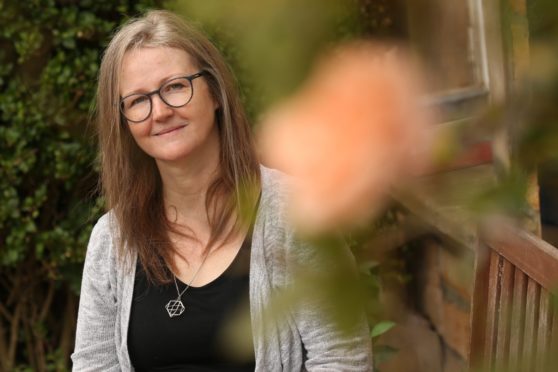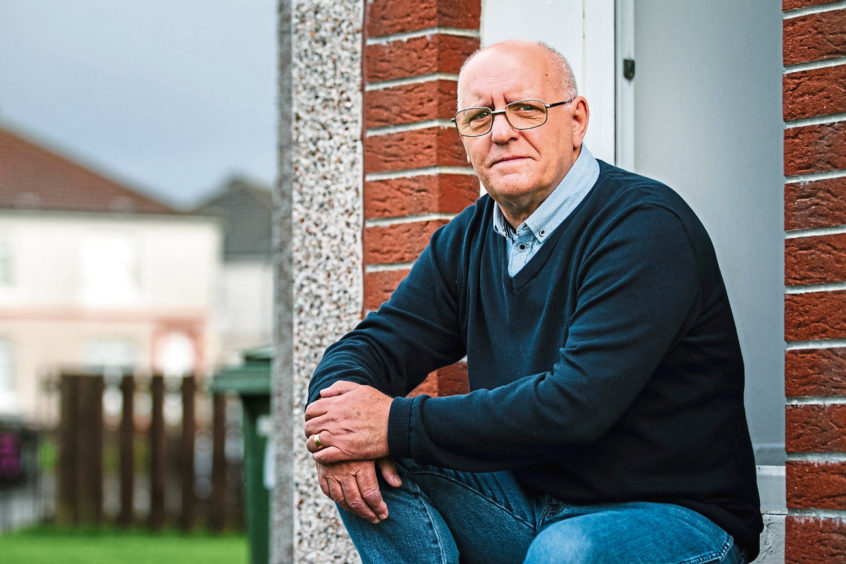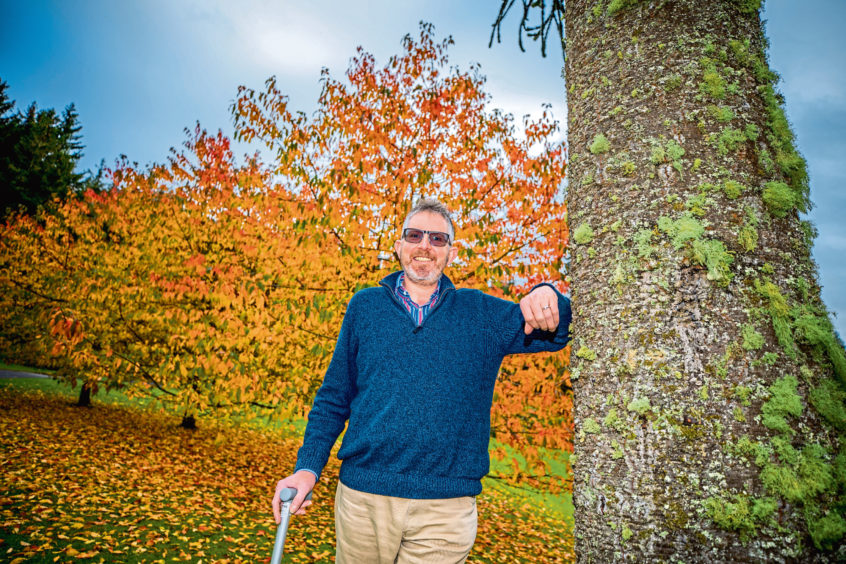
Patients enduring so-called Long Covid are suffering enduring damage to their lungs, according to Scots researchers.
An estimated one in 50 people who have contracted the virus struggle with long-term problems as a range of different and debilitating symptoms, including exhaustion and breathlessness, abate and recur.
Colin Berry, professor of cardiology and imaging at Glasgow University, is leading the CISCO-19 study into the affects of Covid. He believes scans of patients who have recovered after being admitted to hospital are showing signs of long-term damage.
Professor Berry has recruited 160 survivors and 20 people who have not had Covid as a control group, and said: “In our Covid study, women and men are equally represented and the average age for both is around 55 years.
“Health and care workers, who have a higher risk of Covid, and those in public-facing professions including bus and taxi drivers, are well represented in our study.
“Our initial impression is that most patients do not have significant heart damage, although this has happened to some patients, and our research is ongoing.
“We see a greater incidence of damage to the lungs because Covid is mainly a respiratory infection.”
One of those taking part in the CISCO-19 study is retired taxi driver Dominic Hicks, 67, who became so ill from Covid in April he feared he would die.
On leaving the Queen Elizabeth University Hospital in Glasgow, he was so tired he could not climb the few steps to get into his house.
Today, six months later, stairs are still a struggle and he fears this will be a legacy of the virus.
“My GP has told me that my lungs have been scarred by Covid and that I will have to live with this,” he said. “They will never be the same but I am so glad to have survived because at one point in hospital I collapsed on the room floor and can remember doctors and nurses struggling to get me back into bed.
“I remember them putting an oxygen mask on my face and working hard to get this into my lungs. They warned me my next step was ICU but I managed to recover enough to stay isolated in my hospital room.
“I spent 16 days in hospital and then these months since April, trying to get back to something resembling my previous fitness.”
Last week Dominic spent more than an hour in a body scanner while his vital organs were examined in detail for the CISCO-19 study.
“You have to spend quite a while in a huge diagnostic tube obeying instructions,” he said, “but it was my way of saying thanks to medical research of previous years that saved me in April. They say I will get the results on damage done by Covid sometime soon. I can walk, but stairs are still difficult, and I live in an upstairs house.”
Part of his recovery plan was a fundraising walk for a children’s charity – the John O’Byrne Foundation, which helps sick children.
A campaign group that supports Long Covid sufferers welcomed professor Berry’s research, but warned that patients who were not admitted to hospital were still waiting for care for their post-viral illnesses months later.
Lesley McNiven, of the Long Covid Support Group, who featured in a Sunday Post investigation into Long Covid in August, says victims have been plagued for months with symptoms that include exhaustion, breathlessness, palpitations, brain fog and other chronic illnesses.
She said: “One member was promised a heart scan in April and is still waiting. We are disappointed by the lack of real care and research for those who were not seriously ill with the virus but have suffered for months since.
“It is extremely unhelpful to be told that Long Covid will pass, especially after the Scottish Government has acknowledge that it is a considerable problem and offered a framework of recovery. We need to know when this will begin because Long Covid patients are desperate to take part in research and treatment.”
Long Covid patient Maggie Cornock, 63, from Montrose, is still waiting for a chest scan after suffering from breathlessness and exhaustion for seven months.
She said: “We have been given online support and guidance on physiotherapy and appreciate the challenges Covid presents to treating patients, but there is a considerable number of people like us now waiting for scans and the research desperately needed to drive forward long-haul treatment.”
The Scottish Government said: “We are already taking action to support those experiencing the longer physical and mental health impacts of Covid and recognise that rehabilitation, clinical input and research are all critical to understanding and supporting recovery.
“That is why, on October 5, the Chief Scientist Office launched a further call for Scottish-led research into this important issue. This is in addition to the £5m we recently awarded to 15 Scottish research institutions to better understand the effects of infection and inform treatment and management of the virus.”
I spent 50 days in a coma but, thankfully, can’t recall a thing
Professor Grant McIntyre is the Covid-19 patient that spent the longest time in hospital in Scotland.
He spent 128 days in hospital, including 50 in a coma, and is still dealing with the after-effects.
Today, almost eight months later, he is working to regain sensation in his hands. Professor McIntyre, 49, clinical director at Dundee Dental Hospital, was so ill he needed ECMO treatment, where a machine takes over the work of the heart and lungs, and was given 56 pints of blood to keep his vital organs oxygenated.
Two months after leaving hospital, where he lost four stone and suffered terrifying hallucinations linked to so-called ICU psychosis, he is battling to walk without a stick and hopes to return to work at the end of the year. “I am working through a programme of physiotherapy and occupational therapy,” he said.
“I am ready mentally to return but am undergoing treatment for the legacy of pain in my hands and feet. This involves working to recover a lack of grip in my hands as good dexterity is necessary for a working dentist.
“My GP has referred me to a rheumatologist for the chronic pain issue and I will continue with therapy for grip strength along with physiotherapy until my muscle strength and stamina return to normal.
“Mentally, I feel I have recovered well enough for work and am keen to return.”
He recalls his time in ICU as exhausting and terrifying. “I remember nothing of the 50 days I spent in a coma, which is probably for the best. After coming out of the coma I struggled to understand who I was, where I was and who the people around me were.
“For around a week I had terrifying episodes where I could see a python wrapping its way around me along with various other animals in the ceiling. I also thought the hospital staff were trying to kill me, which is not uncommon in hospital patients recovering from comas. Again, the nursing staff were incredibly reassuring.
“However, this episode lasted around a week and was part of the price of recovery.
“When I first became ill, I had an out-of-body experience where I was floating on the ceiling looking down on myself in bed. I am still haunted by this to some extent, but so grateful to have survived.”
I never thought it would take so long to get better. I would just like to feel like myself again
Lily Burns, 21, is still battling the effects of being struck down by Covid-19 almost six months after she spent a week in an induced coma to keep her alive.
Lily was running a 5k charity race when she first felt the effects of Covid and had to drop out and make her way home. By the next day she was exhausted and being constantly sick so her mum, Ainsley, drove her to their local Belford Hospital in Fort William at 5am.
Doctors diagnosed a kidney infection and two Covid tests confirmed she was suffering from the virus so badly she was transferred to intensive care, 63 miles away at Raigmore Hospital in Inverness.
Attempts to lower Lily’s temperature and get enough oxygen into her lungs proved difficult and she was put into a medically-induced coma for seven days to keep her alive. “I remember nothing of it but was told later that doctors were struggling to get enough oxygen into my body.
“My response to the Covid was so severe it overtook my whole body and seriously affected my heart, lungs and kidneys.
“I got a blood transfusion to top up the oxygen being delivered to my body.”
Today, almost six months later, she is recovering but still feels exhausted. And Lily is now desperate to return to her former life as a talented barber.
“I have styled friends’ hair in an attempt to get back to the job I love. However, I am tired even after a couple of hours’ styling. I never thought it would take so long to recover from Covid, certainly not at 21.
“You hear of asymptomatic people who get hardly any symptoms at all and there are people like me who were seriously ill and are spending months recovering.
“Besides the exhaustion, I have pain in my joints, but hope this, too, will improve in time. I am recovering, and still see a consultant at Raigmore Hospital with online consultations.
“These will continue until I am back to full health…soon, I hope. I just want to get back to work and be fit and fully healthy like I was before.”
While she was in the coma, Lily’s family spoke to her through a video link.
“They were told I might be able to hear them but, if I did, I can’t remember, because of the coma.
“I will be eternally grateful to the staff for everything they did to save me.”
The insurers
Insurance companies are watching medical research closely to see if they will have to adjust the cost of cover for people who had Covid.
Any evidence of long-term damage on vital organs could make policies more expensive, according to experts.
It comes as research is beginning to reveal if patients with the virus can suffer long-term damage.
The Association of British Insurers says it is monitoring data on the long-term impact Covid has on the future health of policy holders, saying: “Insurers are committed to helping people get the cover they need and will regularly review their approaches as new data and medical understanding of Covid-19 develops.”
Research from Glasgow University has uncovered lung damage in some recovered Covid patients who had been so seriously ill they needed hospital treatment.
A number will make good recoveries but others are still recovering more than seven months later.
Leading longevity specialist Conor O’Reilly said: “The long-term impact on vital organs could make some people a considerable long-term risk. Insurers will be examining carefully all the data.”
Mr O’Reilly, an actuary from Club Vita Actuaries, added: “There are life insurers who will lose out because they did not plan for a pandemic but who now have to pay out on policies held by previously healthy people. Pension funds who do not have to pay out for people who died earlier than expected will benefit.”

Enjoy the convenience of having The Sunday Post delivered as a digital ePaper straight to your smartphone, tablet or computer.
Subscribe for only £5.49 a month and enjoy all the benefits of the printed paper as a digital replica.
Subscribe © Andrew Cawley
© Andrew Cawley © Steve MacDougall/DCTMedia
© Steve MacDougall/DCTMedia